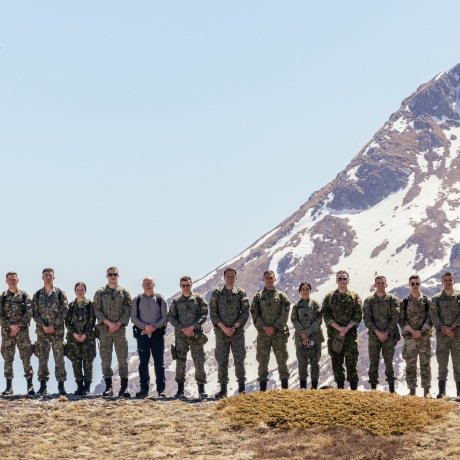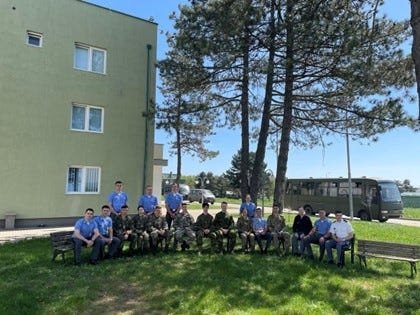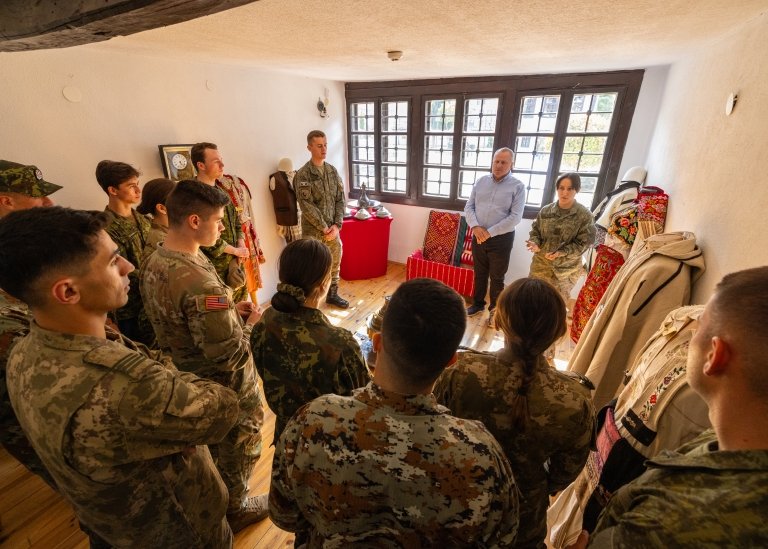Norwich cadets attend the International Cadets Week hosted by the Center for University Studies – Kosovo Defense Academy in the Republic of Kosovo
Norwich University has strived to provide practical and experiential learning to its students since its founding. That centuries-old tradition continues today as a pair of Norwich cadets traveled to the Republic of Kosovo, where they attended International Cadets Week hosted by the Center for University Studies – Kosovo Defense Academy.

Norwich University has strived to provide practical and experiential learning to its students since its founding. That centuries-old tradition continues today as a pair of Norwich cadets traveled to the Republic of Kosovo, where they attended International Cadets Week hosted by the Center for University Studies – Kosovo Defense Academy.
Capt. Bajram Geci, an instructor at the Defense Academy, extended the invitation to Norwich University through faculty member Travis Morris, Ph.D., on behalf of the Commander of the Center for University Studies – Defense Academy Maj. Mimoza Budeci. Morris, the director of Norwich University’s Peace and War Center, invited cadets Aaron F. Whitlock and Ana Lemler to attend alongside him as Norwich representatives and author reflection pieces for the Norwich Peace and War Center’s Substack.
International Cadets Week is designed to include recreational activities, cultural immersion, and networking opportunities with cadets from local and regional institutions, as well as overseas institutions. This year saw cadets from the United States of America, Republic of Albania, Canada, the Republic of North Macedonia, and the Republic of Turkey collaborating and learning from one another during the event. “This was an incredible experience for our cadets. They were able to work with other military cadets and advanced their understanding of the complexities associated with the Balkans,” said Morris. “We want our cadets to be globally minded and feel completely comfortable and competent when working across cultures, and experiences like International Cadets Week at the Defense Academy enable our cadets to become more effective junior military officers.”
The Norwich delegation arrived at the Pristina International Airport in Kosovo on April 11. Once on the ground, the group were taken to the Defense Academy, treated to lunch in the mess hall, and were officially welcomed to the academy. The rest of day one was spent at their leisure as they visited the town of Pristina and networked during dinner.
The following days were packed with various activities. One of the first briefings the group of international cadets received encompassed the Defense Academy’s partner academies. “Meeting other officers and those training to be officers changed my perspective on the career field,” wrote Lemler in her reflection. “I always thought of officers as leaders before friends, and intelligent, dutiful workers. However, after going to Kosovo, I’ve realized the importance of interpersonal interactions with the people you are charged to lead.”
Cadets were constantly immersed in Kosovar culture in addition to their military-focused activities. “Intercultural competence is one of the greatest tools that the modern officer can have in their toolbox,” wrote Whitlock. “Exposure to different cultures than our own help create better, more informed, and aware leaders.” Some of that exposure came through daily free time in the capital city, but there were additional, intentional dives into culture through the sessions hosted by the Defense Academy, such as a visit to the Museum of Pristina and a cultural visit to the country’s second most populous city, Prizren. “While visiting Prizren, the old Albanian capital, you could view the cityscape pan out into the plains with thousands of houses and mosque spires,” wrote Lemler. “Realizing that all of it had been built in the past decades was humbling and inspiring. Some of the buildings remained in their collapsed, bombarded ruins, but the fact remained that these people were never going to give up who they were.”
While Norwich cadets Whitlock and Lemler learned about who the Kosovars are, they were also able to find some familiarity in Kosovo through a repelling session, visiting the Sharr mountains while hiking at Brod, Dragash, and the sense of community and appreciation of service in their society. “Going to Kosovo, training with them, and finding a family gave me a more thorough view on how America deals with foreign relations and the importance America has in international affairs,” wrote Lemler. “Many people we met would greet us because of the respect they had for the military. It was an assurance that the career I had chosen was truly one of service.”
After days in Kosovo, the Norwich group was ready to return home with their newly expanded arsenal of knowledge and understanding. “This cultural exchange only lasted four days, but the connections I made will last a lifetime. These people make me a more effective officer because they share a part of life with me that I would be ignorant about without them,” wrote Lemler, who was echoed by Whitlock in his reflection. “Diverse skillsets, or lack thereof, are what will make and break officers in today’s military,” he wrote. “The world we live in is vastly different from the world our forefathers knew. New ways to communicate are rapidly expanding into every corner of the globe. Concurrently, new global threats are manifesting each day. In this new age, we must take our allies’ and partners’ security as seriously as our own. We truly live in an international community.”
Read More

Norwich University Endorses Duffek, LaCroix, and Walker for the Truman Scholarship
By Thy Yang
Three students earn the University's endorsement in pursuit of the prestigious Truman Scholarship.
7 min read

A Different View of The Hill: Sam Eckholm Tells the Norwich Story
By Zack Bennett
From muddy boots at the Dog River Run to conversations with campus leaders, Air Force veteran and internationally known content creator Sam Eckholm immerses himself in Norwich life to capture the spirit, discipline, and “I Will Try” mindset that define the student experience.
10 min read

NUCE Senior Spotlight: C/CPT Edward Phillips '26
By NU Department of Civil Engineering and Construction Management
Norwich's civil engineering program celebrates one of its many high-achieving students.
2 min read


